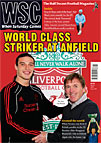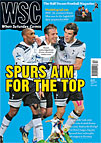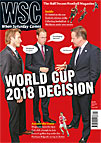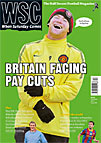 Dear WSC,
Dear WSC,
Geoff Bradford’s article in WSC 288 about the suspicious betting and playing patterns in a Serie B game sparked a vague memory in me, which I confirmed by a trawl through some decades-old football books. On page 13 of his account of Brighton’s first season in Division One (1979-80), John Vinnicombe recounts the odds offered on the Seagulls getting a result against Arsenal in their opening match, but then says: “Punters could not, of course, bet on the result of a single game. They had to have their money on at least three.”
The “of course” in Vinnicombe’s statement suggests that in the late 1970s the sport was well aware of the dangers of allowing money to be made by gambling on a single result. When, then, did this rule change, and why? It would seem a sensible safeguard against the kind of manipulation Geoff believes he saw in Italy. The logistical problems with fixing three matches instead of one are immense, and suspicious betting patterns surely even easier to spot. And would the bookies lose out? Would punters be somehow less interested in betting on three games rather than one? A bet is a bet, surely.
But of course, the football associations have no authority over bookmakers. Indeed, as Geoff points out, through sponsorship and outright ownership of clubs – like Brighton – by men who have made their money in that industry, influence currently runs the other way. Global action would also be required. I, like Geoff, am not optimistic about what this means for football as a genuine sport.
Drew Whitworth, Hebden Bridge
Dear WSC
Harry Pearson’s review of the recent Tommy Lawton biography (WSC 288) was of great personal interest to me. The biographers seem to suggest that Mr Lawton’s shocking move to Notts County in 1947 was not money-driven as most people assumed, but more of a protest against draconian employment laws and the Chelsea board at the time. This makes more sense of a story I included in my recent book on the history of Fram Reykjavik FC. According to my sources, Tommy Lawton showed interest in becoming manager of Fram in 1947 and entered informal talks with the Fram board. At that time, the Icelandic championship involved only five teams that played each other on the only legal pitch in the country. The Icelandic season took place in the summer, so occasionally British footballers would spend their holidays there, earning a few bob coaching, while attracting a lot of female interest. However, the idea of a player such as Tommy Lawton even considering showing up in Iceland in 1947 seemed so bizarre that I seriously considered leaving it out, but eventually decided to trust
my sources. Harry Pearson compares Lawton’s move to Notts County in 1947 as equivalent to Wayne Rooney signing for the Magpies, but for Lawton to Fram think something more along the lines of East Timor or Outer Mongolia. But all this makes more sense if the player mostly intended to teach his superiors at Stamford Bridge a lesson. Perhaps now we – the fans of mighty Fram Reykjavik – can stop fantasising about how great it all could have been under Tommy?
Stefan Palsson, Reykjavik, Iceland
Dear WSC
I’d like to add John Motson to the list of people often using a particular phrase repeatedly in order to make it look like a trademark… but more about that in
a minute.
Keith Chapman, London
Dear WSC
In reply to the letter about Derek Parkin and the (No) Parkin(g) sign (WSC 288). I remember that Football League Review once printed a photo of Peter Shilton standing next to a signpost for the small town of Earl Shilton in Leicestershire with the caption saying something like: “One day that may be his title!” Shilton may also have been among the many goalkeepers who patiently posed in front of “Keep Out!” and “No Entry” signs. In fact there used to be so many of these type of photos that players’ contracts must have specified that they agree to “being depicted next to occupationally relevant signage whenever requested”.
Graham Forshaw, Uttoxeter
Dear WSC
Does Law 4 not matter any more? In the recent FA Cup replay between Manchester City and Leicester City both goalkeepers and all three officials were in black. Law 4 says, as I am sure you know: “The two teams must wear colours that distinguish them from each other and also the referee and the assistant referees… Each goalkeeper must wear colours that distinguish him from the other players, the referee and the assistant referees.” If the televised games don’t adhere to that, what hope is there for the ref on a Sunday morning? Secondly, I shall scream if I hear that dreadful baseball expression “step up to the plate” used in a football context. Or any other for that matter.
Thomas Allen, Albufeira, Portugal
Dear WSC
The Owen Amos article in WSC 288 regarding the play-offs for defeated FA Cup semi-finalists stirred memories on two fronts. Firstly, the England v England Youth game wasn’t actually billed as such in the press at the time, I can remember it always being advertised as England against Young England, who were in fact the Under-23 team. I think it became unpopular due to the players being generally unavailable through injury or tiredness (no change there then) and the better players being occupied with the following day’s proceedings.
I was a bit surprised that the third/fourth place play-off lasted as long as five years – I thought it only lasted three at most, but then again it wasn’t the most popular of fixtures even in the days when there wasn’t much televised football. The so-called mementoes made available to players to make the game more attractive were in fact tankards. The winning players got silver tankards and the runners-up received pewter versions. I can vaguely recall Bobby Charlton saying something polite about the quality of his prize but still not able to hide his disdain at having to play an extra unwanted game, a bit like the European Super Cup – but that’s another matter.
Jim McDougall, Reading
Dear WSC
When Tony Pulis proposed promotion and relegation for referees, my initial reaction was similar to that of Chris Barltrop (Letters, WSC 287) – that it was a bad idea from a grumpy manager thinking the whole world was conspiring against him. However, on reflection, I think the Stoke boss may be on to something. All the subsequent attention, of course, was on officials “facing the chop” from the Premier League – but for every relegation there has to be a promotion, and that opens up a whole world of possibilities. Chris Barltrop conceded that “the best referees should be in control of games at the highest level”, but I would go further – why not allow them to progress through the pyramid in exactly the same way as clubs do? The logical conclusion would be to give automatic promotion to the top two refs in each division, while the next best pair are judged by their ability to oversee the play-off semi-finals. Referees in danger of relegation could be given otherwise meaningless end-of-season fixtures, which might just add a little extra spice to those matches. However, I don’t agree with Pulis that this should all be based on an annual end-of-season vote. Where’s the fun in that? I’d suggest keeping the current assessor system – but let’s make the results public, so that we can see “league tables” of referees in the papers every weekend. Surely this would make the whole system more transparent – and I can’t see Sir Alex being concerned at all when the lowest-ranked official is assigned to a Manchester United game. Feel free to pass my details on to Mr Blatter!
David Emanuel, Littleborough
Dear WSC
Howard Pattison’s article on blue plaques (WSC 286) rightly pointed out that football doesn’t get its fair share of the honours. But outside London, fans can push the boat out, as he says. Even in Birmingham something is stirring, but it’s not easy. The case of the missing wall shows that determination is required. A couple of years ago the Aston Villa Supporters’ Trust together with the club erected a statue outside the new Trinity Road stand of William McGregor. This local shopkeeper was the man who thought up the idea of a league system of football clubs. Until he proposed the idea in 1888 there were only cup competitions, and a lack of a regular source of finance. McGregor’s idea was accepted and the world’s first league system was the result. But until the fans raised the issue, the only recognition of his achievement was a plaque inside the main entrance where few people ever saw it. The statue put that right, but it was still nothing that a non-footballing public was likely to clap eyes on, so the idea was floated of putting a blue plaque on his shop. Sadly, the shop had been demolished in a slum clearance scheme. Still, the local library turned up the address, 309 Summer Lane, where a factory now stands. Alas, the factory is now derelict and looks ripe for demolition in its turn. Two obstacles now remain. The first is finding out who owns the wall where the shop used to stand. The second is finding out whether the wall will be demolished before we try to put a plaque on it. Even this doesn’t end the problems, since the local civic society has to approve the actual construction and, while sympathetic, they might not see it as a priority. But if we can find a wall to hang a plaque on and get the approval of everyone concerned, William McGregor will have his plaque in due course.
Trevor Fisher, Stafford
Dear WSC
Perhaps the final word on old-fashioned things taken to the match? For about 15 years now a chap who sits very close to me in the Paddock at Anfield has come to every game with an old wooden rattle upon which is hand-painted “Every Liddell helps”, probably dating it to the mid-1950s at the latest. Sadly we need a bit more than that these days.
Nigel Power, Liverpool
Dear WSC
In the article Fact versus fiction (WSC 288), Ian Preece rightly points out that football novels are thin on the ground. May I point him in the direction of Steve Bruce? After been sacked as Huddersfield manager in 2000, and out of a job, Bruce turned his talents to writing. Three football murder mystery novels appeared, Striker, Sweeper and Defender, inspired by the work of Dick Francis. A typically enthralling excerpt reads: “The gun was level with my belly. So this was what it was like to die. There was no doubt I was going to die. And not even in Newcastle. Not even Premier League. In Halifax, of all places, with a club in the third division.” As Bruce admits himself: “They were the biggest load of crap ever written.”
Chris Olewicz, Sheffield
Dear WSC
On the subject of empty seats at games, I went to buy a couple of tickets for Wigan v Arsenal on December 29. To my surprise they refused to sell them to me. Despite the fact that I am retired, was with my wife, am Lancastrian, live in Norfolk and a lifelong Bury supporter (with a membership card to prove it) they decided I was a security risk. Their evidence was that the only time I have ever bought a ticket at Wigan before was for the game against Arsenal two seasons ago, and therefore was identified on the computer as an Arsenal fan. To be fair, when I wrote to the club I received a very nice letter from the commercial manager offering me two tickets for £20 for the game against Fulham. After some thought I declined the offer and went to watch Boreham Wood v Chelmsford instead. Mind you, as Meadow Park, Boreham Wood, is also the home ground of
Arsenal Ladies, that is probably another black mark against me on the Wigan
computer.
Jeff Hoyle, Kings Lynn
Dear WSC
In his letter in WSC 288 Ed Parkinson notes that my article on Partizan Belgrade’s participation in the Champions League (WSC 287) portrayed the club’s supporters – the Gravediggers – in an over-positive light. In particular, Ed
highlighted the murder of Toulouse supporter Brice Taton by members of this group in 2009. Prior to the article in question, I also wrote about the darker side of Serbian football in an article for the WSC website (WSC Daily, October 21). This piece did indeed discuss Brice Taton’s death, among others, at the hands of Belgrade thugs, alongside the unsavoury past of football hooligan involvement in Arkan’s paramilitary force during the early 1990s. I am well aware of these links between football in the former Yugoslavia and the brutal activities of the paramilitary organisations of the 1990s, having spent the last four years documenting this subject in my work (see for example the International Journal of the History of Sport, 26:9, 2009). My motive for writing this piece with a non-violent focus was to demonstrate that there is another side to football in Serbia. Numerous articles, including my own, have gone into great detail with regards to the deplorable violence which afflicts the game across the former Yugoslavia. But so little is ever said about the game itself, about the vast majority of Serbian football supporters who do not indulge in violence and
concentrate instead upon backing their own teams.
Hence, while I join Ed in wholeheartedly condemning the attack which led to Brice Taton’s death, I am also keen to emphasise the existence of positive aspects surrounding the Serbian game, to categorically separate the violent criminal behaviour of a minority from the passionate supporting of the majority and to prevent a situation where violent hooliganism becomes the only legitimate topic of conversation.
Richard Mills, Eye, Suffolk
From WSC 289 March 201
 Paul Buller attended a fiery discussion about the responsibilities of UK sports reporting, and left with some questions of his own
Paul Buller attended a fiery discussion about the responsibilities of UK sports reporting, and left with some questions of his own

